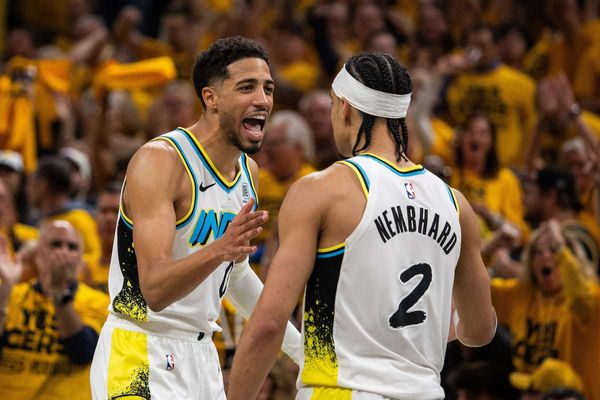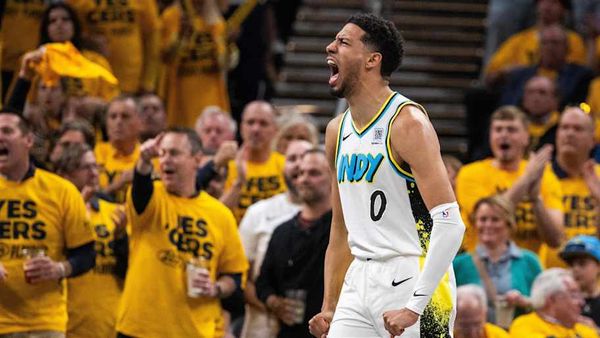
This book by a former federal prosecutor is subtitled “How Powerful People Get Away With It” but its overwhelming focus is Donald Trump and Merrick Garland, the most famous unindicted miscreant of modern times and the attorney general most responsible for the failure, so far, to prosecute any of his offences.
Elie Honig writes that a “staggering parade” of Trump’s henchmen have been indicted, convicted, imprisoned or all three: Michael Cohen, Roger Stone, Paul Manafort, Michael Flynn, Steve Bannon, Peter Navarro, Rick Gates, George Papadopoulos, Lev Parnas, Igor Fruman, Thomas Barrack, Elliott Broidy, Sam Patten, George Nader, Allen Weisselberg and – last but not least – the Trump Organization itself.
And yet, somehow, “a lawless Houdini … stands at the epicenter of the carnage, untouched, undeterred, and, if anything, emboldened”.
Honig thinks the district attorney of Fulton county, Georgia, is still “the most likely to indict Trump” for his efforts to tamper with election results. But Honig makes a powerful case that “the prime opportunities to hold Trump criminally accountable for his actions have passed”, as federal and state prosecutors, especially Garland, “have fumbled away their best chances and inexcusably allowed years to lapse without meaningful action”.
In the last four years, justice department leaders have zigzagged between extremes. First there was the wildly political and persistently dishonest William Barr, whose efforts to keep Trump safe ranged from keeping his name out of the indictment of Cohen for illegal hush money paid to Stormy Daniels, to Barr’s flatly false assertion that evidence developed by the special counsel Robert Mueller was “not sufficient to establish that the president committed an obstruction of justice offense”.
Then came Garland, who is the opposite of Barr but who so far has managed to be nearly as helpful to Trump as his predecessor.
“The problem,” Honig writes, “is in seeking to … restore political independence [for the justice department], Garland has gone too far ...
“It’s one thing to do the job without regard to politics. But it’s another to contort ordinary prosecutorial judgement to avoid doing anything that might even be perceived as political or controversial.”
Honig prosecuted more than a hundred members of the mafia. He recounts several such cases, highlighting the similarities between the chiefs of famous families like the Luccheses and Gambinos and the man at the top of the Trump Organization.
One way in which they operate the same way is to make sure subordinates lie to protect their boss, without being directly ordered to do so. For example, Cohen perjured himself when he said Trump’s efforts to build a tower in Moscow ended before the Iowa caucuses in 2016. They actually continued for months, into the “heart of the presidential campaign”.
Honig writes: “Trump never said to Cohen, ‘I need you to lie for me.’ Instead, Trump openly lied in public about the timing of the Russia deal ‘for all to see’ – including Cohen.
“Therein lies the beauty of being a boss. Trump never said the magic words that would have obviously given rise to criminal liability.”
Honig also focuses on the dubious ethics of the former Manhattan district attorney Cyrus Vance Jr, who bungled a chance to indict two of Trump’s children over the Trump Soho project, then did the same with an investigation of Trump himself.
The lawyer for Donald Trump Jr and Ivanka Trump was Marc Kasowitz. As the New Yorker, ProPublica and WNYC reported, Kasowitz gave Vance a $25,000 campaign contribution in January 2012 – just five months before meeting with Vance about the Trump kids’ case.
Vance returned Kasowitz’s contribution just before his meeting with Kasowitz. Three months after the meeting, Vance dropped the case against the Trumps. Incredibly, just a few weeks after that, “Vance accepted a brand new, even larger campaign contribution from Kasowitz, who personally donated almost $32,000 and raised at least $18,000 more.” Five years later – only after the New Yorker had reported those additional contributions – Vance returned Kasowitz’s contribution again!
“This much is beyond dispute,” Honig writes. “The sequence here looked terrible.”
But no one comes out looking worse than Garland. Trump was protected while he was in the White House by a decades-old justice department memorandum which concluded it was impossible to indict a sitting president. After 21 January 2021, Trump lost that protection. But for many months, Garland did nothing concrete to take advantage.

Honig offers the seven-count indictment he says he would have brought against Trump if he were the prosecutor in charge. It would include:
Count 1: obstruction of justice. The Mueller report’s description of Trump’s firing of the FBI director James Comey and his attempts to fire special counsel Mueller provides overwhelming evident that “Trump obstructed justice”.
Count 2: campaign finance violations connected to hush money paid to two of Trump’s alleged former girlfriends.
Count 3: bribery, extortion, foreign election aid and witness retaliating and tampering, all of which were the subject of Trump’s first impeachment.
Count 4: conspiracy, obstruction of an official proceeding and election interference – the subject of the second impeachment.
Honig’s final conclusion: while “Garland plays by Marquess of Queensbury rules”, Trump is “a remorseless street brawler”. Garland could have brought criminal charges “but he didn’t, at least not in a timely manner … As many advantages as the system gave to Trump, and as aggressive and effective as he has been in exploiting them, Garland still could have achieved some measure of justice, if he had just done his job.”
This week brought the news that Jack Smith, the special counsel belatedly appointed by Garland to investigate Trump, had subpoenaed Trump’s former vice-president, Mike Pence, as part of his investigation of the former president’s post-election activities.
Perhaps the justice department will manage to defy expectations and return an indictment against Donald Trump. This powerful book, however, offers very little hope for that most desirable outcome.
Untouchable: How Powerful People Get Away With It is published in the US by Harper







